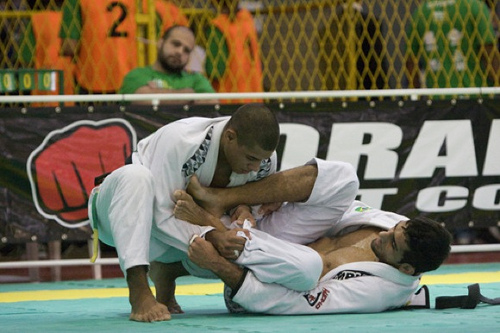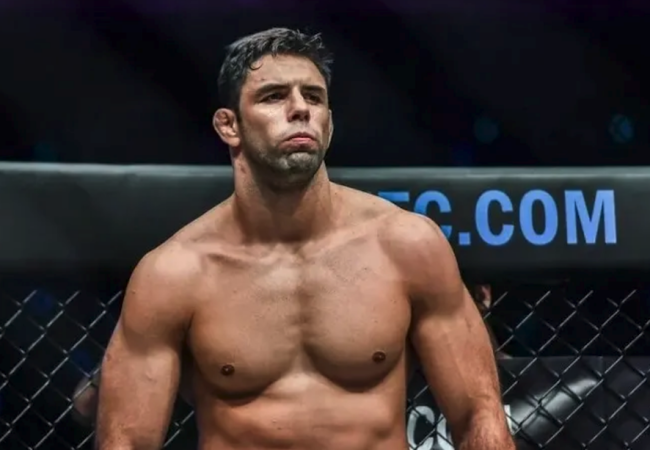At heart I’m still just a kid from a lower-class neighborhood in Baltimore: a nobody fighting to be somebody, fighting for security in my life. That is my edge and thank God I still have it.” Frank Curreri
While some folks do Jiu-Jitsu for their health, to make friends or defend themselves, Frank Curreri does it to try and rid himself of the monkey that’s been on his back for the last 18 years, with both hooks in deep.
After defying all odds, escaping an underprivileged childhood in inner-city Baltimore to get an education and cover important stories as a correspondent for major newspapers, one would think Frank should be pretty pleased with himself. Add to that how he has spent the last three years traveling the globe writing about a sport he loves as one of the UFC/WEC’s main scribes and you have to wonder what’s wrong with the guy. If you must know, the crux of his restlessness is that fate robbed him of a dream when he was just 19, and Jiu-Jitsu is his way of trying to steal it back.
“My life is monotonous and far from glamorous, but I realize my window for greatness is closing,” are the modest description of Curreri’s life that fight fans who read the articles he is paid to write would disagree with and his allusion to what is ultimately bugging him. That he won the brown belt masters division at the last No-Gi World Championship and took bronze in the adult division the previous year, only losing to Guilherme Mendes (about as good as it gets), doesn’t make him feel any more glamorous or greater – perhaps just on the right track.
He had the greatness he yearns for in his grasp when a successful high school wrestling career led to a berth on Division I team University of Maryland. He was on course for a shot at his dream of being the best when a blood clot blocking an artery nearly cost him his right leg, shattering his hopes his very first year of college, at an age when most folks are just beginning to wonder what they want to do with their lives.
If Frank could be satisfied with accomplishments on other fronts, the fact that in the five years it took him to regain proper use of his leg he won an award for journalism from his alma mater – known for producing top journalists – and began the career reporting headlining stories for major newspapers that later led to an exciting gig working for the Ultimate Fighting Championship would seem like a silver lining to his tragedy. But the only part of what followed that fateful blood clot to come close to mollifying Curreri’s disquiet is that the journalism filling the void left by his abbreviated wrestling stint brought him to Pedro Sauer’s academy in Salt Lake City, Utah, where he reported for The Salt Lake City Tribune.
When he began practicing Jiu-Jitsu with Pedro in 2001 as the “1-millionth guy to thank Royce Gracie” for opening his eyes to the art, Frank’s dream of grappling greatness was resurrected. The gentle art offered the means to pursue his arrested aspirations, reencounter his identity as a martial artist, and live in practice the philosophy he studied those years crippled at the University of Maryland.
“Jiu-Jitsu and martial arts are not just hobbies for me; they are a way of life. They are part of who I am, my identity,” the brown belt world champion of the masters division asserts, making clear he is far from done – but on his way. “A black belt, whenever it comes, is just one part of that journey, not a destination. Jiu-Jitsu has helped elevate my self-consciousness, how I interact with the world, how I perceive the world. It is almost like a form of therapy for me,” referring to scars left by the violent surroundings of his boyhood growing up in a place he quotes H.L. Mencken as having dubbed “The City of Anger”, where half his friends either ended up “in jail, or dead, or on parole.”
Now married with a year-old son in Las Vegas, where work has him in close quarters with all those who are where he strives to be, Frank found in Robert Drysdale the right mentor to guide him in his quest to “quench his thirst for grappling success” in earnest. “A champion’s energy has a way of rubbing off on you,” he explains, perhaps suggesting the 2007 ADCC absolute champion embodies the final objective; and the “atmosphere where teammates are super-passionate about BJJ or fighting, not just hobbyists,” at the archetype’s academy further stokes his exhilaration that he might just be able to make it before his window closes.
Whether or not Frank Curreri – now over 37 years of age – will make it to his own personal finishing line remains to be seen. He does, however, have a special weapon his origins bestowed upon him: the fire kindled by the indelible wounds of someone life has beaten up but never beaten, as he puts plainly, “I always compete as if I’m still dirt poor, or as if it could have been me in jail or on drugs. I compete as if the other guy is trying to take something from me. I find a dark place inside me, and it comes from those days in Baltimore. At heart I’m still just a kid from a lower-class neighborhood in Baltimore: a nobody fighting to be somebody, fighting for security in my life. That is my edge and thank God I still have it.”
Given Frank’s grit and dogged desire to win, it would seem unwise to bet against him completing his mission. But for someone who seems to have acquired a taste for taking hard knocks and keeping his feet, betting on him to ever be satisfied would be a long shot, too – even if he wrenches that monkey off his back, passes guard, and pounds it into oblivion dropping elbows.



